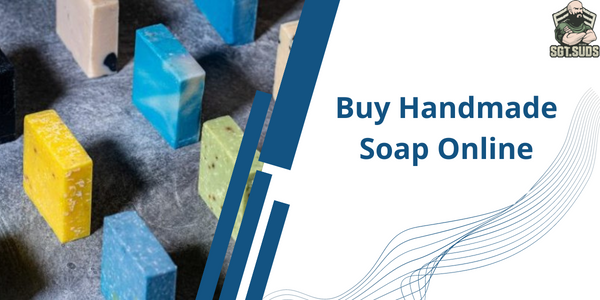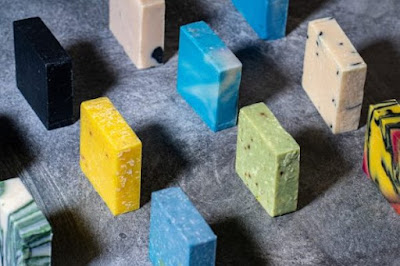Thin Blue Bar Handmade Soap Buy Online
we are offer you Best Quality handmade Saops with Affordable Price . You Can Buy Thin Blue Bar Handmade Soap Buy Online From By Website.There is something so ancient and alluring about Sandalwood.The depth and exotic richness of this scent have been bewitching humans since antiquity; and, once we’re told, its easy to see that it forms the base of some of the most exquisite perfumes in the world.Perhaps without knowing it, we associate this multi-faceted scent with quality and as something to be treasured.Sadly, in recent years, our desire to surround ourselves with this special smell has outstripped our desire to treasure it.The result, not surprisingly, is that the majestic Santalum Album tree that must live for at least 30 years before its precious oil is harvested, is now endangered or, more specifically ‘vulnerable’.
Q- Where’s your Sandalwood Soap?
Ans-For some years now, despite a great number of customer requests, endangered Sandalwood trees meant that we could not or, more importantly perhaps, would not, create a sandalwood soap.Just as we do not take the easy or more ‘commercial’ route with our products and refuse to use palm oil in any of our range, so we refused (and continue to refuse) to use environmentally-damaging sandalwood oil or any synthetic imitations in any of our soaps.That was… until we discovered some non-endangered sandalwood varieties Never ones to turn down a challenge – particularly a scent-related one! – for more than 2 years we have been busily exploring ways we could bring you a gorgeously-scented sandalwood soap that didn’t have a negative environmental impact.
Over this time, we’ve looked at and experimented with a wide variety of sandalwood oils and suppliers from all over the world.And finally, with the kind help of some lovely testers, are very proud to introduce you to the fruits of our labours…
Q-What is Natural Soap?
Ans-1-When we call our soap ‘natural’, what we mean is that all the ingredients we use to make it are natural. What is our definition of natural? Well a commonsense one. If it comes from or is a plant, vegetable, mineral or animal byproduct (e.g. honey or milk) then its natural. Hence our use of e.g. olive oil (from the olive fruit) and shea butter (from the shea nut) in our soaps. all our soaps are vegetarian and therefore no actual parts of animals (e.g. lard or cochineal) are present in any of our soaps.
2-If something is artificially manipulated in a lab (ie compounds are put together in ways that don’t occur in this way in nature), then this won’t make it into our soaps.These sorts of compounds are often referred to as ‘nature-identical’ ingredients and cover so-called ‘natural’ colourants like micas, or ‘natural’ fragrance oils.
3-Many ‘natural’ soaps contain these ingredients, Ours do not. If it hasn’t been extracted directly from the plant (or isn’t still a plant – e.g. seaweed or carrot powder), then it doesn’t make it into our soaps.
Q-So is your soap really natural?
Ans-Coconut Milk being readied for soap makingWhat’s your definition of natural?
1-If you mean – is it naturally ocurring and does it grow on a tree? Then the answer is, of course, no.
2-If you mean – is it only made from ingredients that people would commonly understand as being natural; in other words those that come directly from a plant, mineral or animal byproduct? Then the answer is yes.
3-We would add though that the only animal byproducts we use in our soaps are honey and milk (no actual animal parts are used, such as lard or cochineal).
4-Also, because we make all natural soap, some of our oils have necessarily undergone a saponification process (using an alkali), in order to change them from being an oil you can eat into oil that makes you clean. NONE of that alkali we use remains in our final soap bars.
5-Our soaps are also free from ‘nature-identical’ ingredients, such as micas and synthetically-produced so-called ‘natural’ colourants and fragrances.They are also produced using our unique ‘extra cold’ method. This involves a refusal to heat our oils* (as the majority of even ‘cold process’ soap makers do), and a focus on respecting and supporting the natural soap making reaction with minimal interference.
Tips
1-Try to (safely) cut the soap bars as small as possible. This will help to melt the soap more quickly.
2-A see-through bowl is helpful as you can easily see the water level below and prevent it boiling dry.
3-When your soap reaches the ‘mashed potato stage’, you might have some small lumps of hard (older) soap. You can keep on cooking and adding water or to try and dissolve these, but I generally just leave them and enjoy the flecks of colour.
4-Any mould will pretty much do. If it is rigid, then popping it in the freezer for 1/2 an hour will help it to release. Flexible, silicone muffin moulds are handy as you can easily turn them inside out to pop your soap out.
5-Cling film placed on the surface of your soap will give you a smooth result.The harder you let your soap get before using it, the longer it will last.
Benefits of Using Natural Soap
There are several benefits to using natural soap, including:
1. Real Soap Instead of "Fake Soap"
Many products that are advertised or displayed using terms like ‘cleanser,’ ‘body bar,’ ‘body wash,’ ‘beauty bar,’ ‘skincare bar,’ and even ‘deodorant soap’ are actually detergent based products, and not really soaps at all.
2. Natural Soap is Highly Moisturising
One of the benefits of using real soap is that one of the by-products of the production process is glycerine. Glycerine is an excellent skin moisturiser because it attracts moisture to itself in and around the skin. Traditionally made soaps contain glycerine, and so they hydrate the skin during bathing, whereas many commercially manufactured soaps can dry skin out. Why? Because store-bought, commercial soaps usually undergo a process designed specifically to remove the glycerine.
3. Better Ingredients Used
When a company manufactures hundreds of thousands, or even millions of bars of soap at a time, part of the profit margin is gained from mass production, and part is gained from using the cheapest products available – and these are often synthetic substitutes for the real thing.
4-Many believe that these synthetic products can sometimes be damaging to the endocrine, reproductive, respiratory and immune systems – not to mention the potential damage they do by drying out your skin.Commercial soaps are known to regularly contain Parabens, Sulphates, and Triclosan, which are thought to trigger allergies, to influence hormone levels, and possibly increase risk of some cancers.Natural soaps, however, usually use natural ingredients like olive and coconut oils, shea butter, and grass-fed tallow. These are believed to be very healthy and nourishing for the skin.
5. Wider Choice
As mentioned above, organic soaps are normally made in small batches by a local producer. Small batches not only mean easier control, but also a wider variety of products. Each batch is easily changed to a new scent or style without having to retool large factory equipment. These soaps are therefore easily customisable too. Colour, shape, size, grainy or smooth texture, scent, batch size, and other features are frequently changed to provide maximum choice for the consumer. You can even buy organic soaps in coffee, cinnamon, peppermint, or fruit scents!
6-Better for the Environment
Organic soaps do not produce harmful environmental poisons or toxins. The soap breaks down more easily after use and does not harm the water cycle or the wildlife that shares the water in our rivers, lakes, and the oceans. This eco-friendliness would be a strong argument for using organic soaps, even if all else was equal. Add to it the great quality and efficacy of the soaps, and the pleasure you get from a more unique product, and they are a clear winner.
tags-Thin Blue Bar Handmade Soap Buy Online, Buy Thin Blue Bar Handmade Soap Online,
.jpg)


Comments
Post a Comment